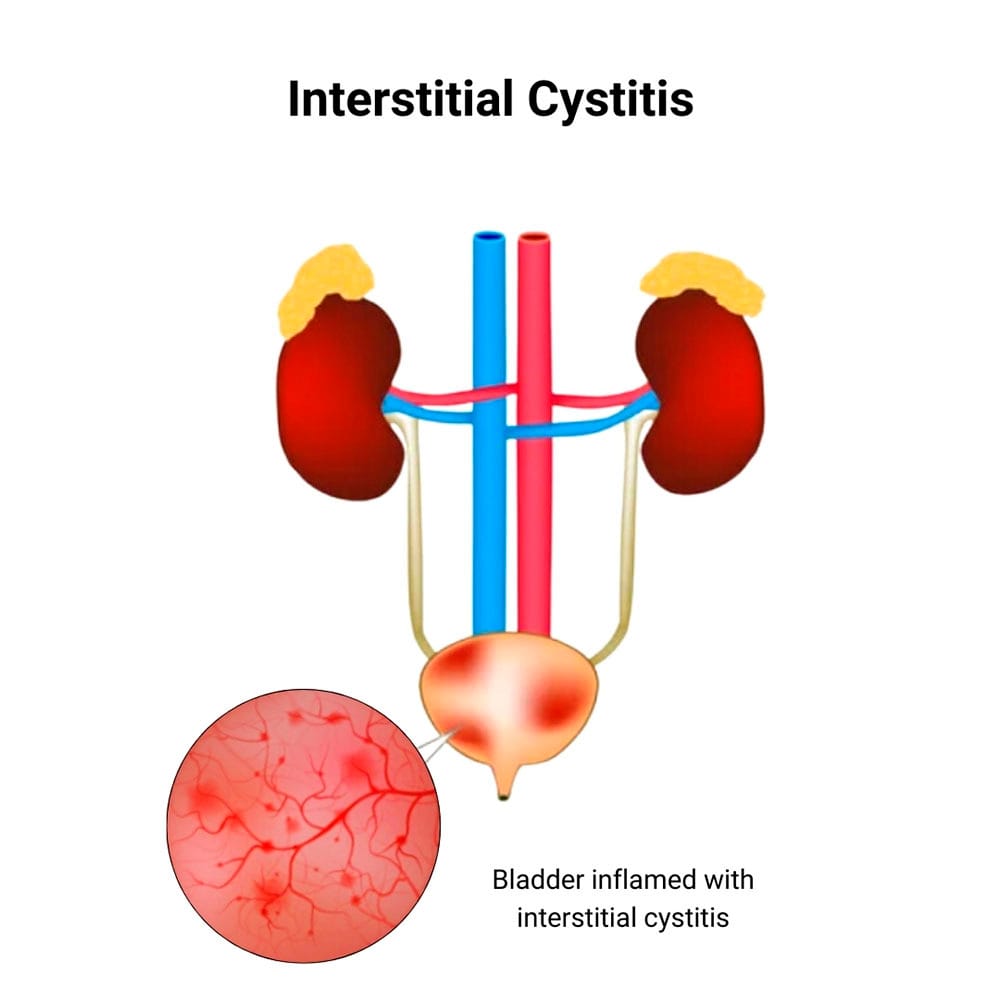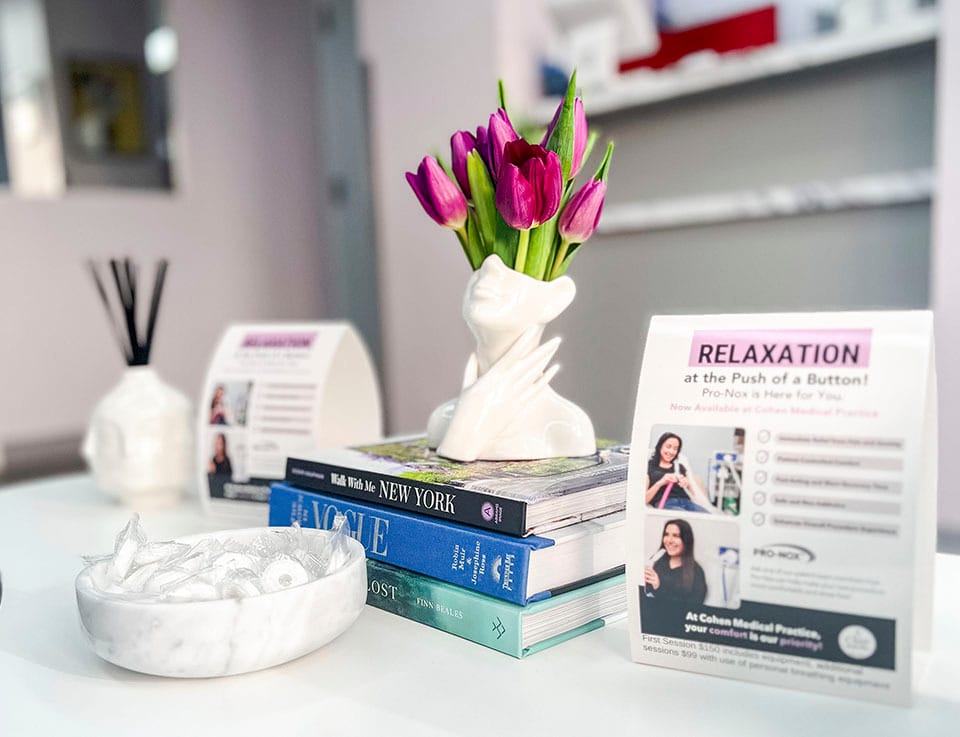What Is Interstitial Cystitis?
 Interstitial cystitis (IC), also called bladder pain syndrome (BPS), is a chronic disease that causes pain and discomfort in the bladder and surrounding tissues. Unlike typical urinary tract infections, IC is not caused by an infection but involves inflammation of the bladder wall. The bladder is a muscle that stores urine until it can exit the body. With IC, you might feel like you need to urinate often, even when your bladder isn’t full. The bladder wall can become swollen or inflamed. IC occurs in males and females; however, it’s more prevalent among women than men.
Interstitial cystitis (IC), also called bladder pain syndrome (BPS), is a chronic disease that causes pain and discomfort in the bladder and surrounding tissues. Unlike typical urinary tract infections, IC is not caused by an infection but involves inflammation of the bladder wall. The bladder is a muscle that stores urine until it can exit the body. With IC, you might feel like you need to urinate often, even when your bladder isn’t full. The bladder wall can become swollen or inflamed. IC occurs in males and females; however, it’s more prevalent among women than men.
If frequent bathroom trips and bladder discomfort disrupt your life, IC might be the culprit. Dr. Felix Cohen with his years of experience in gynecological surgery and feminine health, works with you to create a treatment plan that fits your lifestyle. His team at Cohen Medical Practice (CMP) in Midtown NYC provide accurate diagnoses of bladder issues and effective treatments for a wide range of gynecological conditions.
What Are the Common Symptoms of Interstitial Cystitis?
Pelvic pain is one of the foremost symptoms you may be experiencing. You also may feel as if your bladder area is under a continuous ache or pressure. You may also experience this discomfort in your lower abdomen and even in your lower back. In addition to the pelvic pain, you may also have a heavy or full feeling in your bladder like it’s always full even when it’s not.
Other symptoms include:
- Frequent urination
- Pain during urination
- Urgency to urinate
- Pain during intercourse
Interstitial cystitis is hard to deal with, especially because you can have different symptoms from one day to the next. Sometimes, your symptoms can be very mild for extended periods and suddenly become much worse. Some of the factors that lead to flare-ups include stress, particular types of food or exercise and changes in hormone levels.
What Causes Interstitial Cystitis?
The most common theory is that inflammation is the main cause of IC. The epithelium, which is the protective lining of your bladder, should protect deeper tissues from urine. But when this lining is injured or thin, harsh materials in your urine can leak through and create inflammation. This chronic inflammation could be why you feel pain and pressure in your bladder and need to pee all the time.
IC is usually caused by:
- Stretching of the bladder by waiting too long to empty it
- Pelvic floor muscles weakened or damaged
- Autoimmune disorders
- Repeated bacterial infections
- Pelvic nerve hypersensitivity or inflammation
- Spinal cord trauma
IC may be partly caused by genetics too. While there are allusions to IC running in the family in some studies, this information is not definitive or widespread. You may be more likely to develop IC yourself if people in your family have the condition, even though no specific genetic factors causing IC have been proven.
How Is Interstitial Cystitis Diagnosed?
Your diagnostic journey usually begins with a thorough review of your medical history. The doctor asks you what your symptoms are and how long you’ve had them. A physical exam gives your doctor an idea of your general health and whether you might have IC or another condition.
Your CMP doctor focuses on your abdominal and pelvic regions, gently pressing to feel for tenderness, masses or other problems.
Additional diagnostic tests may include:
- A urinalysis that tests a urine sample to detect signs of infection or inflammation
- A cystoscopy, which is a diagnostic procedure where the urologist inserts a thin tube called a cystoscope into your urethra to visually examine it closer
- A bladder wall biopsy that consists of taking a tiny piece of the bladder tissue, which is subsequently examined under a microscope by a pathologist
What Treatments Are Available for Interstitial Cystitis?
Bladder training gives you a stronger, more determined bladder to be able to hold more urine and reduce the urge to go frequently. By extending the amount of time between bathroom visits, you begin teaching your bladder to hold more urine.
Some women find relief with bladder instillations also. This procedure is performed in a clinic visit with your CMP doctor who places a tiny amount of liquid medication into your bladder to help reduce symptoms and bring comfort.
Other available treatments include:
- Pelvic floor exercises. Exercises, called Kegel exercises, tone and stretch the muscles of the pelvic floor, reduce pain and improve bladder function.
- Manual therapy. Massage and other techniques can reduce muscle tension and increase blood flow as well.
- Stress management. As stress contributes to the cause of IC, things like meditation, yoga and relaxation techniques may be helpful.
Most individuals with IC don’t need surgery. Surgery may be considered though, once you’ve gone through all the other methods of treatment and are still in severe pain. In such cases, a few surgical options exist like bladder augmentation, in which the bladder is made larger to work better. You may also have a cystectomy, which involves removing the bladder entirely.
Founder and director of CMP New York, Dr. Cohen, is a board certified obstetrician and gynecologist with extensive experience in female conditions and gynecological treatments. Contact Cohen Medical Practice (CMP) for a precise diagnosis and personalized treatment plan for interstitial cystitis as well as for everything else, ranging from your annual gynecological exam to fertility services and menopause care.

